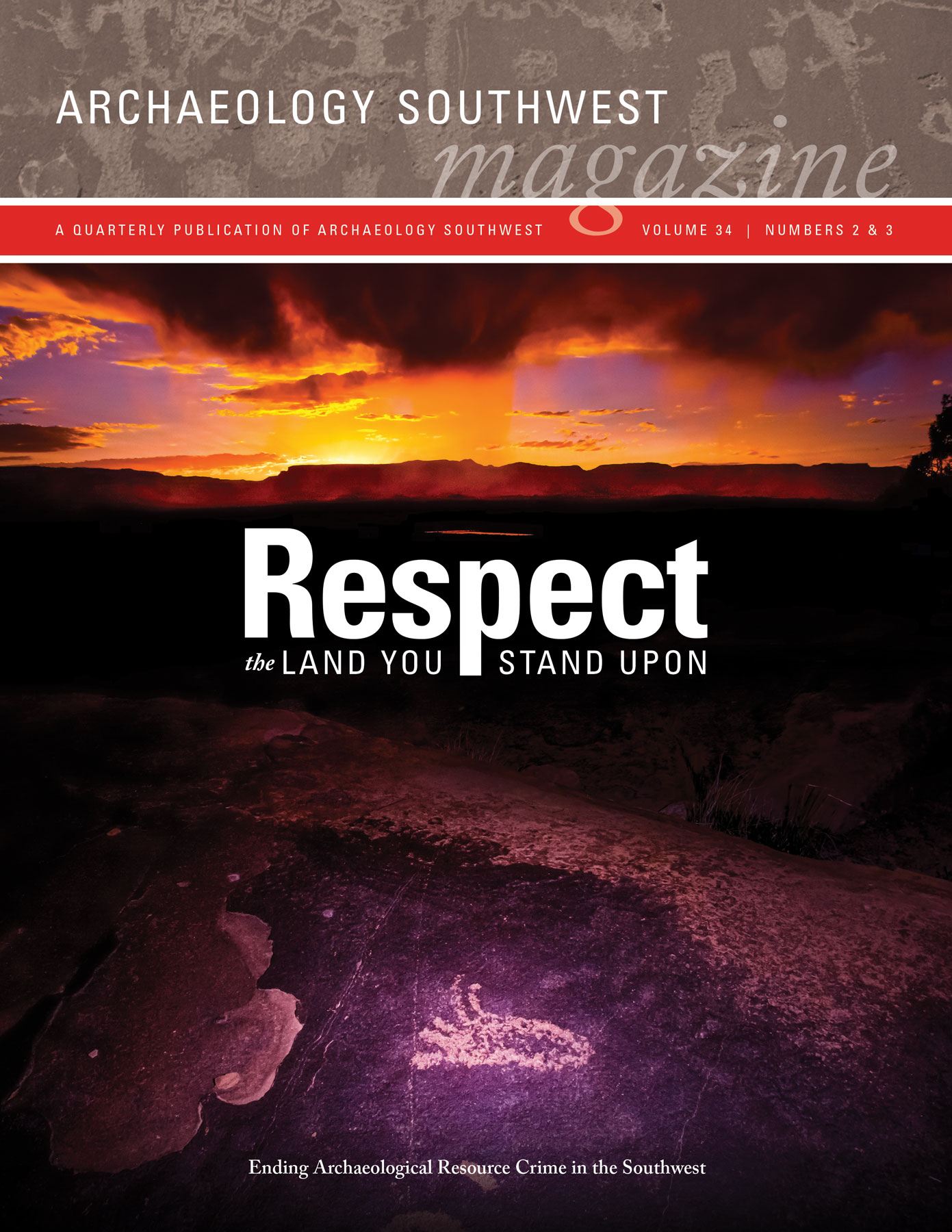Description
Inside this issue:
Respect the Land You Stand Upon, Lyle Balenquah
The Bureau of Indian Affairs–Archaeology Southwest ARPA Assistance Initiative, Stacy L. Ryan
Stopping Archaeological Vandalism in Utah, Elizabeth Hora
Looting and Mimbres, Christopher A. Turnbow
Historical Perspective on Enforcing the Archaeological Resources Protection Act and the Native American Graves Protection and Repatriation Act, John Fryar
Spotlight: Archaeological Resources Protection Act 101, Shannon Cowell
Archaeological Investigation and Crime Scene Investigation, Martin E. McAllister
When an Archaeological Site Becomes a Crime Scene, D. J. “Dusty” Whiting
Spotlight: Assessing Damage, Stacy L. Ryan and Shannon Cowell
New Paths to a Successful ARPA Prosecution, Randy Ream
Spotlight: Fort Apache Dirtscapes, John R. Welch, Fred Nials, and D. J. “Dusty” Whiting
What Does a Crime Against History Look Like? Stacy L. Ryan, Shannon Cowell, and John R. Welch
In Search of Data, Shannon Cowell
Everything Is a Sacred, Living Entity: An Apache Perspective on Archaeological Resource Crime, Ramon Riley and John R. Welch
Safeguarding Ancestral Footprints: A Hopi Perspective on Archaeological Resource Crime, Stewart B. Koyiyumptewa
Our Way of Life Is Forever Disrupted: A Hopi Perspective on Archaeological Resource Crime, Benjamin H. Nuvamsa and John R. Welch
The Gold Is in the People: A Zuni Perspective on Archaeological Resource Crime, Kenny Bowekaty
Looting dóó Vandalism éí dóódá! A Navajo Perspective on Archaeological Resource Crime, Richard M. Begay
Remnants of a Lifeway, Sources of Strength: A Ute Perspective on Archaeological Resource Crime, Betsy Chapoose
Petroglyph Conservation and Preservation in the Gila River Indian Community, Teresa Rodrigues, Chris Loendorf, and M. Kyle Woodson
Protecting Cultural Heritage, Stacy L. Ryan
Back Sight, William H. Doelle
Archaeology Southwest Magazine Vol. 34, Nos. 2 & 3
Issue editor: Stacy L. Ryan
This double issue explores the hows and whys of ending and responding to archaeological resource crime (ARC) on Tribal lands. We are particularly honored to share the perspectives of members of seven different Tribes, some of whom are Tribal cultural resource managers. All speak to the very real toll ARC takes on Tribal communities.
Respect the Land You Stand Upon, Lyle Balenquah
The Bureau of Indian Affairs–Archaeology Southwest ARPA Assistance Initiative, Stacy L. Ryan
SaveHistory.org
Save History on Facebook
“Preservation Archaeology’s Role in Responding to Archaeological Resource Crimes,” Archaeology Café Online presentation with Stacy Ryan and D. J. “Dusty” Whiting, February 2, 2021.
More on Cooperative Ecosystem Studies Units
Stopping Archaeological Vandalism in Utah, Elizabeth Hora
Utah Public Archaeology Network
Stop Archaeological Vandalism
Looting and Mimbres, Christopher A. Turnbow
Archaeology Southwest Magazine Vol. 31, No. 1: Mimbres Preservation, Pithouses, Pueblos, and Pottery
Historical Perspective on Enforcing the Archaeological Resources Protection Act and the Native American Graves Protection and Repatriation Act, John Fryar
John Fryar (2002). Testimony of John Fryar, United States Sentencing Commission Public Hearing, February 26, 2002.
For a discussion of the Task Force, see Phil Young (1994). Cultural Resource Protection in the Southwest Region: The ARPA Task Force. Ranger: The Journal of the Association of National Park Rangers 10(2):8–13.
Garry J. Cantley (2002). Bureau of Indian Affairs Training on Archaeological Resource Crime. CRM 25(2):32–33.
Martin E. McAllister (2002). Archaeological Law Enforcement Training. CRM 25(2):15–16.
Spotlight: Archaeological Resources Protection Act 101, Shannon Cowell
Archaeological Resources Protection Act (PDF)
Archaeological Investigation and Crime Scene Investigation, Martin E. McAllister
When an Archaeological Site Becomes a Crime Scene, D. J. “Dusty” Whiting
“Preservation Archaeology’s Role in Responding to Archaeological Resource Crimes,” Archaeology Café Online presentation with Stacy Ryan and D. J. “Dusty” Whiting, February 2, 2021.
Spotlight: Assessing Damage, Stacy L. Ryan and Shannon Cowell
New Paths to a Successful ARPA Prosecution, Randy Ream
Spotlight: Fort Apache Dirtscapes, John R. Welch, Fred Nials, and D. J. “Dusty” Whiting
More on the forensic sedimentology project
What Does a Crime Against History Look Like? Stacy L. Ryan, Shannon Cowell, and John R. Welch
In Search of Data, Shannon Cowell
Blythe Bowman Proulx (2007). Archaeological Site Looting in “Glocal” Perspective: Nature, Scope, and Frequency, American Journal of Archaeology (117:1) 111–125.
Everything Is a Sacred, Living Entity: An Apache Perspective on Archaeological Resource Crime, Ramon Riley and John R. Welch
White Mountain Apache Tribe
Safeguarding Ancestral Footprints: A Hopi Perspective on Archaeological Resource Crime, Stewart B. Koyiyumptewa
Our Way of Life Is Forever Disrupted: A Hopi Perspective on Archaeological Resource Crime, Benjamin H. Nuvamsa and John R. Welch
Mark Macdonald, “Theft of Sacred Items Damages Hopi Way of Life,” Seattle Times, August 5, 1990.
The Gold Is in the People: A Zuni Perspective on Archaeological Resource Crime, Kenny Bowekaty
Looting dóó Vandalism éí dóódá! A Navajo Perspective on Archaeological Resource Crime, Richard M. Begay
Navajo Nation Heritage and Historic Preservation Division
Remnants of a Lifeway, Sources of Strength: A Ute Perspective on Archaeological Resource Crime, Betsy Chapoose
The Ute Lands map was adapted by Catherine Gilman from a map provided by Betsy Chapoose. The map is based on information provided by Alden Naranjo, Southern Ute elder, to Anthropological Research, LLC, as part of an ethnographic study.
Petroglyph Conservation and Preservation in the Gila River Indian Community, Teresa Rodrigues, Chris Loendorf, and M. Kyle Woodson
Gila River Indian Community, Natural and Cultural Resources Department
Elephant Snot®
Protecting Cultural Heritage, Stacy L. Ryan
Read more about the return of the ceremonial shield to the Pueblo of Acoma
Government Accountability Office (2018). Native American Cultural Property: Additional Agency Actions Needed to Assist Tribes with Repatriating Items from Overseas Auctions
Safeguard Tribal Objects of Patrimony Act of 2021
United Nations Declaration on the Rights of Indigenous Peoples
Back Sight, William H. Doelle
